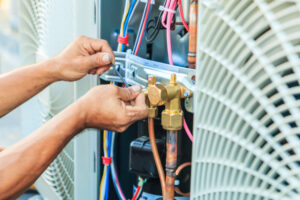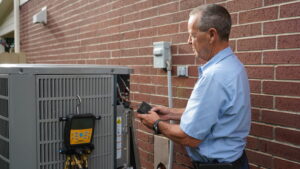What Are the Most Common AC Problems in the Summer?
Hey there, fellow summer lovers!
So, it’s that time of year again. The sun’s blazing, kids are running around like crazy, and you’re probably huddled up next to your AC, right? But what happens when your trusty cooling buddy decides to throw in the towel just when you need it most? Ugh, talk about bad timing!
Let’s chat about some of the most common AC problems we all face when the heat’s on. Trust me, you’re not alone in this sweaty struggle!
1. Warm Air from the Vents
First up on our list of most common AC problems for the summer is when your AC decides to play opposite day You know that moment when you set your thermostat to a nice, cool 68, but your AC’s like, “Nah, let’s make it a sauna instead”? Yeah, that’s the worst. It could be a few things:
- Dirty Air Filters: Over time, filters get clogged with dust and debris. When they’re dirty, they restrict airflow and make the unit work harder. Changing your filters every month or two can help prevent this.
- Refrigerant Leak: Low refrigerant levels cause warm air. If that’s the case, you’ll need a professional to find and fix the leak.
- Thermostat Issues: Sometimes, it’s as simple as having a faulty thermostat that needs replacing.
2. Uneven Cooling
The Hot and Cold War in Your House Ever feel like you’re planet-hopping as you walk from room to room? One’s like the Arctic, the other’s Death Valley. What gives? Could be:
- Dirty Air Filters: Over time, filters get clogged with dust and debris. When they’re dirty, they restrict airflow and make the unit work harder. Changing your filters every month or two can help prevent this.
- Refrigerant Leak: Low refrigerant levels cause warm air. If that’s the case, you’ll need a professional to find and fix the leak.
- Thermostat Issues: Sometimes, it’s as simple as having a faulty thermostat that needs replacing.
3. Strange Noises
Another of the most common AC problems is When Your AC Starts Singing the Blues (or Worse) If your AC’s making more noise than your neighbor’s garage band, something’s up. Listen out for:
- Loose Parts: Components inside the unit might come loose over time. Tightening screws and bolts can often resolve this.
- Fan Issues: Worn-out fan belts or blades can cause loud noises. Replacing them might be necessary.
- Refrigerant Leaks: A hissing noise often indicates a refrigerant leak. This needs immediate attention from a professional.
4. Frequent Cycling
Your AC turns on and off repeatedly, never quite reaching the desired temperature. This frequent cycling is not only annoying but also inefficient. Possible causes include:
- Thermostat Placement: If your thermostat is near a heat source like a window, it can cause short cycling. Relocating it can solve the problem.
- Oversized Unit: An AC that’s too large for your home will cool it quickly but won’t run long enough to dehumidify the air properly. A professional assessment can determine if your unit is the right size.
- Dirty Coils: Both indoor and outdoor coils should be clean. Dirty coils can cause the unit to overheat and cycle frequently.
5. Water Leaks
The Indoor Water Feature You Didn’t Ask For. Finding a puddle by your AC? Unless you’re going for that “indoor swamp” look, this isn’t great. Might be:
- Clogged Drain Line: The drain line can get clogged with algae or debris. Clearing it out can often solve the problem.
- Low Refrigerant: Low refrigerant can cause the evaporator coil to freeze, leading to water dripping when it melts. Refilling the refrigerant and fixing any leaks is essential.
- Broken Pump: If your system has a condensate pump, ensure it’s working correctly to move the water out.
6. High Energy Bills
The Bill That Makes You Want to Cry If your energy bill’s higher than your summer spirits, your AC might be the culprit.
- Age of Unit: Older units are less efficient. Upgrading to a new, energy-efficient model can save money in the long run.
- Poor Maintenance: Regular maintenance, like cleaning coils and changing filters, keeps your unit running efficiently.
- Leaky Ducts: Leaks in your ductwork mean cool air escapes before reaching its destination. Sealing these leaks can improve efficiency.
7. Foul Odors
Last but not least our list of most common AC problems ends on a stinky note. No one wants their home to smell like a musty basement or worse. If your AC is emitting bad odors, it could be due to:
- Mold or Mildew: Moist environments inside the unit can lead to mold or mildew growth. Cleaning or replacing parts may be necessary.
- Burning Smell: An electrical issue could cause a burning smell. Turn off the unit immediately and call a professional.
- Dirty Filters: Sometimes, changing a dirty filter is all it takes to clear up odors.)
- Conclusion
Look, I get it. When it’s hotter than a jalapeno’s armpit outside, the last thing you want is AC drama. But here’s the deal: a little TLC goes a long way. Don’t wait for your AC to have a full-blown meltdown before giving it some attention.
Stay cool out there, friends! And remember, if all else fails, there’s always the good ol’ “stick your head in the freezer” trick. (Kidding! …mostly.) 😉

